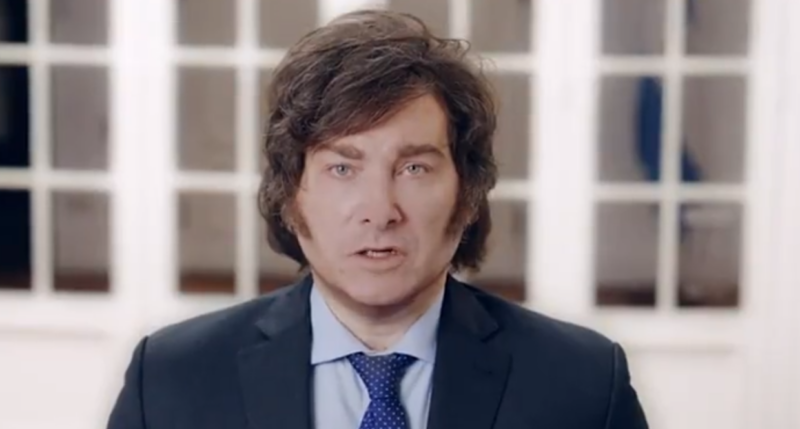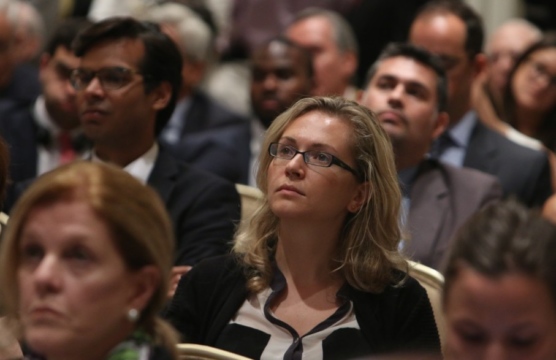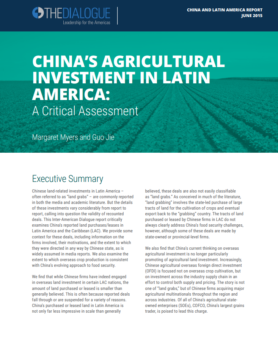The Nationalism of Cristina Fernández de Kirchner
Argentine President Cristina Fernández has increased her appeals to nationalist sentiment to build domestic political support.
Argentina’s poverty level rose in January to its highest level in 20 years, according to a study published by the Catholic University of Argentina. The report shows that 57.4 percent of the country’s population—or roughly 27 million people—are living in poverty. The report blamed rising poverty in part on President Javier Milei’s decision to devalue the peso, though Milei blames prior administrations. What effect have Milei’s policies had on poverty in Argentina? What chance do his policies have at reducing poverty in the long run? How long is the Argentine public likely to give Milei a “honeymoon” for his policies before holding him responsible for increasing economic hardship?
Nicolás Saldías, senior analyst for Latin America and the Caribbean at the Economist Intelligence Unit: “Milei was elected in a landslide to reverse populist economic policies that most Argentines realized were unsustainable. He was clear that he would pursue free market reforms to end distortionary state intervention in the economy, especially the enormous fiscal deficit, price controls and an overvalued exchange rate. The surge in inflation was directly triggered by the devaluation of the peso in December. However, it was an inevitable outcome, as the previous government allowed net foreign reserves to plummet to a negative $11 billion. Even though the rise in poverty was inevitable, Milei’s austerity made it worse. The government’s front-loaded fiscal consolidation relied on inflation eroding the real value of spending, including pensions and public salaries. The government also postponed the rise of the minimum salary, which is used as a benchmark for informal workers. Poverty rates will rise further in the short-term as the government’s shock therapy seeks to bring inflation down to single digits by mid-year. Assuming this occurs, real incomes should rise once again, causing poverty rates to decline. Despite the pain, surveys show that Argentines are still supporting Milei. The latest survey by local pollster Aresco shows that 56 percent still back him. A reason why is because Milei has blamed the country’s troubles on the traditional political establishment. According to a February poll by IPSOS, 69 percent of Argentines say that traditional parties don’t care about them. Milei’s reforms, if they are implemented, should encourage investment, boost employment and bring down poverty in the medium to long-run.”
Carol Wise, professor in the Department of Political Science and International Relations at the University of Southern California: “Last year’s election of Javier Milei on a new third-party ticket may look like something fresh and new, but it isn’t. Rather, Milei’s radical market venture is yet another Argentine economic experiment that is doomed to fail in the absence of sound institutional reforms, both economic and political. Like his Peronist predecessors, namely Carlos Menem (1989-1999), Néstor Kirchner (2003-2007) and Cristina Fernández de Kirchner (2007-2015), Milei too has tried to implement an economic project that circumvents the very institutions that are vital to the success of this effort. For Milei, this includes the Congress, government ministries, labor unions, the central bank and provincial governors. For Milei, the central bank is full of hacks, and Keynesianism is ‘rubbish.’ Menem established a currency board, tightly pegged the peso to the dollar and ran a profligate fiscal policy that ended in a maxi-devaluation a decade later and a default on $100 billion in government-held debt. The Kirchners squandered billions in soybean revenues by raising export taxes on the crop, running the proceeds through the presidency and doling out huge subsidies to urban consumers in exchange for their votes. The end of the 2003-2013 commodity boom drove Argentina into an economic depression that persists to this day. Central bank reserves are near zero, and pundits are now referring to 2014-2024 as another ‘lost decade’ for Argentina. Inflation is rampant, poverty is running above 50 percent of the population and from the standpoint of the average Argentine voter, Milei’s candidacy appeared plausible. Yet, 70 years of institution-bashing and resource-grabbing remind us that there are simply no silver bullets for Argentina. Milei’s facile market shock is yet another primrose path for a nation that has shown an incredible tolerance for economic suffering. For answers, Milei would do well to look to Uruguay, Chile or even Peru.”
Juan Santarcángelo, senior researcher at the National Council for Economic and Technical Research (CONICET) at the National University of Quilmes in Buenos Aires: “Milei is implementing a set of neoliberal economic policies, which are aligned with the interests of large national and international economic groups and are largely responsible for the dramatic situation the country is facing. The impact on the poverty level is dramatic, having risen from 44 percent to 57 percent in an extremely short period. There is no chance that neoliberal policies will reduce poverty in the long term. On the contrary, empirical evidence shows that these kinds of policies in countries that have implemented them have had detrimental effects on poverty in the long term. How long Milei’s honeymoon will last is the big question, as the effect of his policies has been very significant and negative. The stagflation that Milei’s administration has generated has led to many sectors experiencing declines in demand and production levels similar to those the country saw in 2001, all within just two months.”
Mario Rapoport, professor of economics at the University of Buenos Aires: “Javier Milei’s economic policy has had as its main objective the drastic elimination of the nation’s fiscal deficit—inherited from previous administrations—and, as its ultimate goal, the possible dollarization of the economy. At the same time, price deregulation doubled inflation and later added to an increase in rates and prices in energy services, transportation, health and education, which also included cuts in the income of workers and retirees. A provisional fiscal surplus was obtained but at the cost of living conditions being heavily affected. The level of poverty increased to more than half of the population (57.4 percent), affecting the productive system and causing a paralysis of activities and strikes. There is also growing political unrest. Milei prefers confrontation to dialogue, and he does so not only with his Peronist opponents but also with his supposed allies, especially in Congress, where his representation is limited. As part of the adjustment, he cut budget items that correspond to the provinces, thereby entering into a conflict with their governors, who defend the interest of local citizens. In short, the economic and political situation is delicate, and there is no easy way out at the moment.”
 The Latin America Advisor features Q&A from leaders in politics, economics, and finance every business day. It is available to members of the Dialogue’s Corporate Program and others by subscription.
The Latin America Advisor features Q&A from leaders in politics, economics, and finance every business day. It is available to members of the Dialogue’s Corporate Program and others by subscription.
Argentine President Cristina Fernández has increased her appeals to nationalist sentiment to build domestic political support.
Regional integration, social inclusion, and the need for a more competitive business climate—discussed at the XVIII Annual CAF Conference
China is looking for new agricultural investment opportunities in Latin America, but not necessarily for large tracts of land.
 President Javier Milei’s “shock therapy” economic policies have contributed to a rise in poverty in Argentina, according to a recent study.
President Javier Milei’s “shock therapy” economic policies have contributed to a rise in poverty in Argentina, according to a recent study.
 Video
Video
